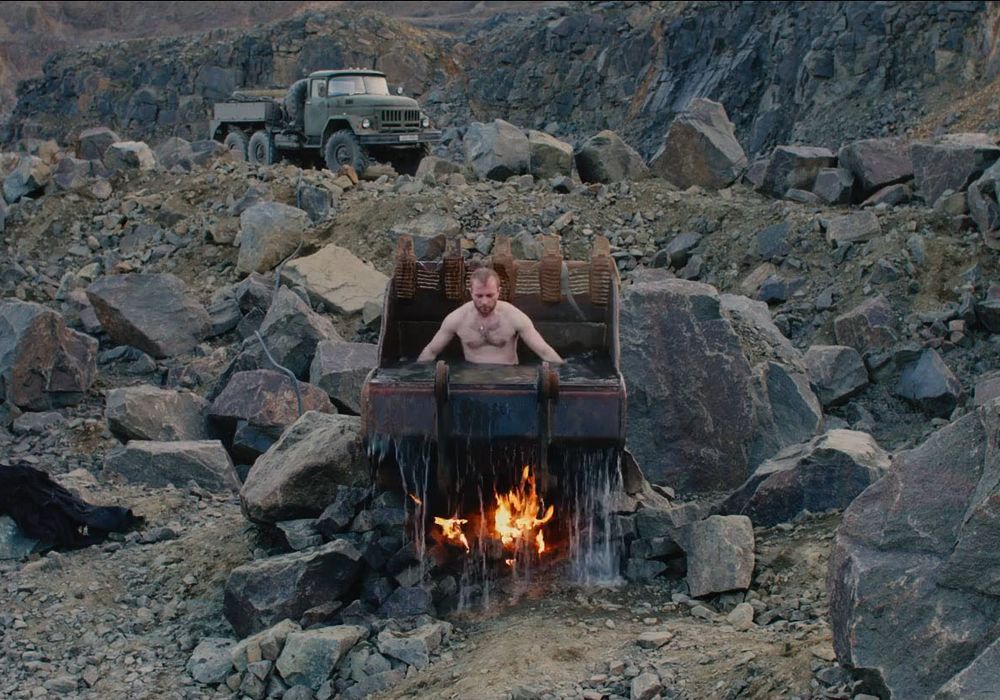In Valentyn Vasyanovych’s post-apocalyptic Atlantis, the sky above Ukraine hangs like a sheet of steel, a uniform mass of clouds bucketing water onto the mud-covered wasteland down below. The year is 2025, and the country has just emerged victorious–if shattered–from a war with Russia. It’s a conflict all too steeped in the decade’s real-life skirmishes between Ukraine and its neighbor to come across as strictly fictional, and that’s the thing that makes Atlantis so disturbing. It’d be tempting to call Vasyanovych’s a dystopia, were it not for that fact that, all through its 108 minutes, everything about it feels almost unbearably vivid–closer to some news report or a post-conflict documentary than any artificial rendition thereof. There are soldiers gingerly plucking mines out of fields, foreign NGOs fretting about the country’s recovery, unidentified corpses exhumed and re-buried, and shell-shocked veterans struggling to find their way back into civilian life.
Enter one of them, Sergiy (Andriy Rymaruk), a laconic decommissioned soldier living with a fellow PTSD-suffering mate in a derelict bunker-turned-house. By the time we first meet him, he’s out with his pal firing at human silhouettes in a makeshift shooting range. They take turns: one holds a stopwatch, the other pulls the trigger, in a routine practice that grows increasingly more complicated and dangerous. And it’s all a static shot, with Vasyanovych (here in a multi-hyphenated stint as director, writer, cinematographer, and editor) keeping the camera fixed as tension between towers in a crescendo of bullets and PTSD-driven rage. It’s a stunning opener that sets the tone–thematically and formally–for the bleak journey that follows. For so much of the tension that permeates Atlantis simmers and detonates inside confined spaces and static shots. Rare are the moments Vasyanovych’s camera is allowed to roam around–with notable exceptions including a haunting car ride down an abandoned factory, and a handheld shot inside the Hades-like smelter Sergiy and his mate find some short-lived employment at. For the most part, the camera remains still, a choice that only amplifies the entrapment and claustrophobia Atlantis’ characters struggle with, and the violence that bursts once the confinement and loneliness feel unbearable.
A grisly portmanteau of a country locked in a post-conflict coma, Atlantis is a far cry from a traditional three-act drama. The plot is thin but far from uneventful, trailing behind Sergiy as a peripatetic and episodic journal, a series of chilling vignettes. After PTSD has the best of his mate, and the factory they work at is forced to shut, the man embarks on a solo pilgrimage across bombed-out Ukraine–fumbling after reasons not to give in to madness and end it all. Which turns out to be just as tricky as drumming up some money to stave off cold and hunger; eventually hired to drive a truck along the frontline (still a red zone, he’s warned) and deliver water to soldiers operating therein, Sergiy’s journey spirals in a series of progressively grimmer encounters, including a trip down memory lane to his former home, now reduced to a pile of rubble and heart-wrenching mementos.
One may argue all the violence and horror Atlantis is packed with eventually blurs into a lifeless, glacial exposé, but I fear that criticizing Vasyanovych for reducing the carnage to some banal routine would be to unwittingly play in the director’s hands. That war is a numbing machinery is precisely the point Atlantis drives home all through Sergiy’s infernal odyssey. And sure, this is hardly a groundbreaking lesson to peddle, but there is something viciously captivating in the unflinching ruthlessness with which Vasyanovych dissects the conflict’s legacy down to its economic, psychological, and human costs. On his way back from a trip to the frontline, Sergiy picks up a young woman. She’s Katya (Liudmyla Bileka), a volunteer working for an organization tasked with exhuming unidentified corpses along the frontline and returning them to their families. Sergiy helps her deliver one to a nearby morgue, and watches as doctors perform the post-mortem–a ritual devoid of any emotional oomph, again framed through a static shot, a medical performance carried out in automaton voices and gestures.
Atlantis works in the same way. This is a surgical, austere examination of war that eschews sentimentality or moralism, and concocts a punch-in-the-gut field diary interspersed with images of agonizing beauty. There are smelted metal casks broken and dumped on the side of the road, liquefying and fuming like lava, cars set ablaze, derelict buildings that look like cavernous and distant cousins to the dystopian infrastructure of Tarkovsky’s 1979 Stalker. But it is not a picture devoid of hope altogether. That scene at the morgue proves pivotal, to an extent both Sergiy and us only understand much later. For Katya gradually turns from an extra into a serendipitous partner: the acquaintance morphs into friendship, the friendship into love. Sergiy joins in her quest, and the two become an unlikely couple of Charon-like figures, shipping water and digging mummified bodies out of mass graves. Katya injects into Atlantis a pale glimmer of hope and romance, but she also opens up the field for what is one of Vasyanovych’s most interesting offerings. “I studied to become an archaeologist,” she tells Sergiy after they drop the first cadaver at the morgue, “and this feels like I’m following my profession.” It’s a rare moment of irony that underscores one of Atlantis‘ saddest lessons, the way war forces its victims to dig up their own history way too early than they should. And so it is for Vasyanovych’s psychically-damaged survivors: holding on to the mirage of one bountiful, serene land that–much like the myth the film’s title ironically alludes to–probably never was, and probably never will be.
Atlantis screened at the Thessaloniki International Film Festival.

